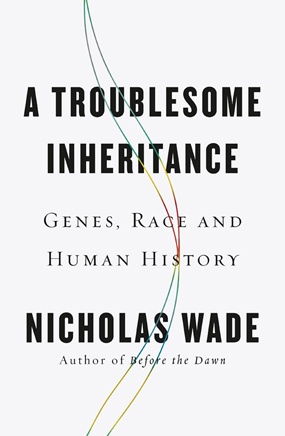During my weekly trawl of the Avenue’s Bookazine shelves, I spotted the book by Nicholas Wade, called A Troublesome Inheritance, subtitled Genes, Race and Human History (ISBN 978-1-50420-623-8, Penguin, 2014).
Wade is no popular theorist, producing supermarket style sensationalism, but is a respected student of evolution, postulating that human evolution is still going on today. He has written two previous books with Before the Dawn being a general survey of evolution in the last 50,000 years and Faith Instinct, which reconstructs the evolution of religious behavior.

There is much discussion in the book as to the nature of evolution, and obviously Charles Darwin features with his methodical studies. However, it is interesting that the phrase “survival of the fittest” did not originate from Darwin (who used the term later) but from an English philosopher Herbert Spencer.
Under the heading “Perversions of science”, author Wade looks at the Eugenics movement and how something that had some intellectual merit could become an abomination in the world as we knew it in WWII.
Our human behavior may not just be cultural, but there are also genetic traits involved, which in turn will affect the way we live in our societies, in other words, our culture! Aggression has been shown to be influenced by gene promoters, and those promoters exist in different proportions depending upon race. This is a very salient point that Wade makes in the book.
The chapters cover a wide spread of ideas, concepts and DNA. These include Evolution, Race and History, Perversions of Science, Origins of Human Social Nature, The Human Experiment, The Genetics of Race, Societies and Institutions, the Recasting of Human Nature, Jewish Adaptations, The Rise of the West and Evolutionary Perspectives on Race.
Author Wade does a particularly good job of explaining to the reader the workings of the double helix DNA and how mutations can occur and may be beneficial to subsequent generations, or the opposite, and even mutations that appear to have no discernable result.
It has been fairly recent in the 50,000 year history of the human race, that genetic evidence has shown the spread of the hunter-gatherer tribes throughout the world and the development of lighter colored skins. It is also shown that the “demographic spread of the Han Chinese is still underway, with less numerous neighbors like the Tibetans and Uigur Turks finding themselves steadily absorbed into the Han demographic imperium.” A glance at the foreign news section of the daily papers will attest to the accuracy of Wade’s description.
For B. 655 you get a fascinating and well researched book which will make you perhaps more interested in the differences with other peoples. It may even come as a great shock that “East Asians score around 105 on intelligence tests, an average above that of Europeans, whose score is 100.” An even greater shock might come from understanding that Caucasians have thinner hair than East Asians, who in turn have dry ear wax and smaller breasts. And you can blame it all on a gene allele called EDAR-V370A. This is not a book you will finish in one weekend!




